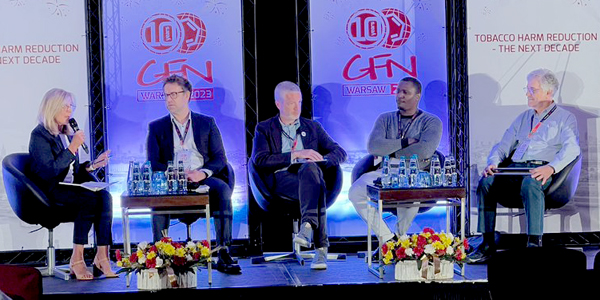
My take-home messages from the GFN 23 conference
Posted on June 27, 2023 By Colin
I HAVE JUST RETURNED HOME from the tenth Global Forum on Nicotine conference in Warsaw. This blog summarises nine key take-away messages from the conference and why I am optimistic about the future.
1. Australia is a laughing stock
One of the most frequent comments by conference delegates was disbelief at Australia’s irrational prescription-only model for vaping, especially as Australia once was a world leader in tobacco control.
Former Victorian MP Fiona Patten began her presentation with, “In Australia, we are leading the way on what not to do. I apologise for that”
One potential upside is that Australia is showing the rest of the world how not to regulate vaping and possibly accelerating change elsewhere. Perhaps this is Mark Butler's underlying plan?
2. We have enough evidence
Drs John Oyston and Roberto Sussman both argued that the science on vaping has largely been resolved. We don’t know everything about vaping (evidence is never complete) but we know a lot. The longer we wait for perfect science, the more harm is done and smokers will continue to die unnecessarily.
As Dr Moira Gilchrist from PMI stated, ‘Ultimately the science becomes impossible to ignore’. I think we are now at that point
The demand for more evidence by vaping opponents is often a ploy to raise doubt and uncertainty and to delay the inevitable. For some, no amount of evidence will ever be enough.
3. Flawed anti-vaping science
In his keynote address, Dr Roberto Sussman showed that much of the science used to oppose vaping is flawed. His research [here and here] found that many laboratory studies claiming to show harm have poor methodology and unreliable results which exaggerate the risk from normal vaping. In fact, he says that “vaping aerosol is less toxic than cooking, candles and odorisers”.
Unfortunately, flawed science is very common and is eagerly propagated by the media.
4. What happened to ‘scientific debate’?
Vaping critics are increasingly unwilling to debate the evidence. As Nancy Loucas said, “They skip the debate and go straight to the smear.”
Both Professor Gerry Simpson and Clive Bates explained that “this is not how science should work”.
Science progresses by curiosity and open mindedness, with debate and engagement to advance scientific understanding
The likely explanation is that anti-vaping arguments are increasingly indefensible. Tobacco Control wants to control the narrative and position themselves as “owners of the truth”. Open discussion is a huge threat and will reveal the weakness of their arguments.
5. The foundations of the anti-vaping case are shaky
We may be closer than we think to resolving the vaping issue. The frequent use of smears, ad hominem attacks, dirty tricks, bad science, avoiding debate, all suggest desperation, and that opposition to vaping is on shaky ground. Meanwhile the evidence supporting vaping gets stronger.
Dr Alex Wodak says, things that can’t stay the same, don’t. Disruptive technologies and new harm reduction strategies are always vigorously opposed but almost always prevail. Vaping will also triumph
6 Vaping is protecting children
We don’t want kids to vape, but the small risks are grossly exaggerated and are weaponised by vaping opponents. But what about the benefits?
It is highly likely that youth vaping is having a positive impact on youth health and wellbeing overall
Vaping is diverting young people away from deadly smoking at a population level and there is very little evidence of harm from short-term experimentation by young non-smokers. See our recent article for more, here.
Added to this is the benefit to young people when their smoking parents switch to vaping: parents live longer and are no longer smoking role models for their children and there is less financial stress on the family.
7. Censorship by medical journals
In her keynote address, Sarah Cooney gave some insights into medical publications. Medical journals often have an anti-vaping editorial policy which is aligned with the views of the health or medical organisations with which they are associated. This undermines open scientific debate and is consistent with the anti-vaping bias of certain publications such as the Medical Journal of Australia, the Australian and New Zealand Journal of Public Health and The Conversation AU (also known as the Monologue).
8. The future of nicotine
Despite Tobacco Control’s war on nicotine, Clive Bates and Professor Jasjit Alhuwalia see a long-term role for nicotine in society for its therapeutic, recreational, and pleasurable effects - long after the smoking epidemic has been contained.
Dr Paul Newhouse gave a keynote presentation on how nicotine improves cognitive function, attention and memory and has benefits for Parkinson's disease and schizophrenia. Other therapeutic effects include stress relief, mood modulation, weight control and improved ADHD. Many users find nicotine is enjoyable and helps them cope.
9. The role of consumers
Vaping policy is a political issue. Decisions are made by policy-makers in Parliament and vaper advocacy is critical. In the early days of vaping in the UK, vapers played an important role in influencing the direction of policy. As Clive Bates said
“The authentic experience of vapers telling their story to elected officials is the key factor for change”
The most important thing you can do is to write to, and preferably visit, your state and federal MPs. You can do this through the Legalise Vaping website here.
Vapers should all join the new Australian consumer advocacy group, the Australian Smokefree Alternatives Consumer Association (ASACA) and get actively involved in the campaign to legalise vaping. Twitter account here. With more support, it may come sooner than you think.